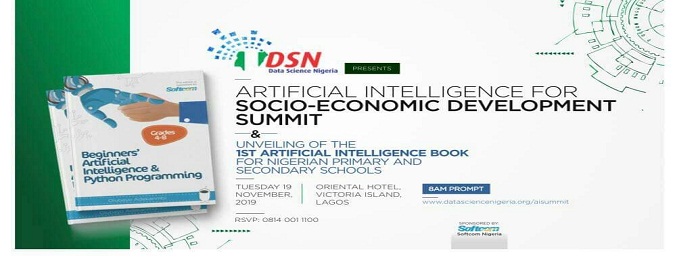Telecom
DSN Summit 2019 to Unveil First AI Book for Nigerian Elementary Schools

In furtherance of its vision to democratize Artificial Intelligence (AI) and position Nigeria as a future global powerhouse in the fourth industrial revolution, Olubayo Adekanmbi, convener of Data Science Nigeria (DSN), has released a first-of-its-kind book that simplifies Artificial Intelligence for primary and secondary schools pupils.
This effort is in alignment with DSN’s roadmap to build a community of one million talented artificial intelligence (AI) specialists in Nigeria during the next 10 years, which will position Nigeria as one of the top 10 AI talent destination in the world, with significant GDP multiplier across all industries.
The book is an effort towards AI knowledge democratization as it simplifies the concept of artificial intelligence in a friendly manner to our young ones, with a view to stimulating their curiosity and driving their interest in learning about AI.
The book starts with generic introductions to the core concepts including machine learning, deep learning and reinforcement learning, and then introduces step-by-step programming using the Python programming language.
My intention is to go beyond the traditional code-first approach and motivate readers by helping them to understand what the knowledge of coding can do particularly in AI as a way to build an application-focused mindset.

The book is driven by a sense of higher purpose to catalyse nationwide capacity building with the skills of the future.
Bayo Adekanmbi said, “By creating pervasive knowledge across the country, we will open opportunities for every Nigerian to build the skills of the future.
“I believe that Nigeria’s population of 200 million, with median age of about 18 years, is a huge strategic advantage that will position Nigeria as one of the top 10 AI knowledge centres in the world, especially if we proactively re-tool and reskill our young ones with relevant skills that can drive increased employability, foreign exchange inflows, AI-enabled start-ups, and enhance the general quality of life through solution-oriented AI applications in health, agriculture, financial inclusion, smart cities, and more.
“This will greatly benefit lives of Nigerians, starting with those who train as data scientists and artificial intelligence specialists.”.
With this book, Nigerian students who want to learn Big Data, Data Science, Machine/Deep Learning and other advanced analytics tools can now access to easy-to-understand simple learning materials with relevant practical exercises.
The book is fully supported by Softcom, and will be distributed free in Nigerian schools.
Olubayo Adekanmbi is an experienced hands-on data scientist, doctoral researcher and business leader with 20 years of experience.
He has led the DSN non-profit vision, which in the last two years of operation has distinguished itself with its transformational initiatives including the 1st Intercampus Machine Learning competition that involved over 10,000 students from 95 universities and polytechnics, dedicated Artificial Intelligence Community Hub, AI Summer Schools for Kids, AI Masterclass sessions for top business executives in Nigeria, industry-oriented hackathons, Learning-based Kaggle competitions, a Mentorship programme, development of Nigeria-centric Machine Learning/Deep learning curriculum/online learning platform, AI+ Clubs in secondary schools, and its highly successful all-expenses-paid Artificial Intelligence Bootcamp.
The book will be unveiled at the annual Artificial Intelligence Summit, scheduled to hold on Tuesday 19 November 2019 at the Oriental Hotel, Victoria Island, Lagos.
The event will run in parallel with the Artificial Intelligence Demystified Masterclass for executive and the all-expense-paid Artificial Intelligence bootcamp, where 26 international experts will be flying to Nigeria as tutors and mentors during the same week.
The events are proudly supported by Microsoft, Softcom, Lagos State Office of Innovation, Terragon Group, Bluechip Technologies, Axa Mansard, Retina-AI USA, Techcabal, Proshare Nigeria, MainOne and Carbon.
Telecom
Mart Networks Rolls Out Tailored Cybersecurity Solution for Fintechs

Mart Networks, a leading cybersecurity distributor across Africa and the Middle East, has unveiled a specialized cybersecurity package tailored for fintech firms.

The solution, powered by Invinsense, Infopercept’s unified cybersecurity platform, aims to address the growing security needs of fintechs operating in highly regulated environments.
According to Moiz Maloo, Managing Director at Mart Networks, fintech companies face unique security challenges due to stringent regulatory requirements and increasing threats. “Most fintechs don’t have the luxury of multiple internal security teams or system integrators. With this focused offering, we’re providing an all-in-one platform with managed services built specifically for the fintech environment,” he said.
The offering integrates four key components: Invinsense XDR and Managed Detection & Response for real-time monitoring, Exposure Management for vulnerability detection, Security Compliance Management to support fintechs in meeting regulatory standards, and Cybersecurity Awareness Programs to empower teams against cyber threats.
Furthermore, the package includes deep application visibility, ensuring fintech-specific applications remain secure through Invinsense SIEM’s custom log ingestion capabilities. To reinforce protection, Infopercept’s engineering team will provide code-level fixes, patches, and infrastructure security enhancements.
With the rise of cloud-based fintech operations, the solution also incorporates full-stack cloud security, including API security, Cloud Infrastructure Entitlement Management (CIEM), and Application Security Posture Management (ASPM).
Mart Networks’ move underscores the growing importance of cybersecurity in Africa’s fintech sector, as financial services become increasingly digital and susceptible to evolving cyber threats.
Telecom
Equinix Expands Digital Footprint in Nigeria with Launch of LG2.3 Data Center

Equinix, Inc. the world’s digital infrastructure company™, has officially opened its latest data center expansion in Lagos. Called LG2.3, the facility will support Nigeria’s growing digital transformation efforts, providing state-of-the-art colocation and secure interconnection solutions which will empower businesses across the region.

It also signifies Equinix’s unwavering dedication to advancing Nigeria’s position in the global digital economy, reinforcing the company’s commitment to the region.
As part of the inauguration, Bruce Owen, President of EMEA at Equinix, along with other Equinix executives, led the ribbon-cutting ceremony at the newly expanded site. In addition to an official visit to the Governor of Lagos State, Equinix hosted an exclusive customer engagement event, bringing together key customers and partners from Nigeria’s business and technology sectors.
Attendees discussed shared successes and Equinix’s role in facilitating digital transformation, while also connecting directly with Bruce Owen for insights into how Equinix’s solutions drive innovation and business agility in the region.
Equinix executives also took part in a tree-planting ceremony, symbolising Equinix’s continued investment in sustainable initiatives across the globe and highlighting the company’s broader goal of reducing its carbon footprint while supporting greener practices across its operations worldwide.
Speaking about the expansion, Bruce Owen, President of EMEA at Equinix said “Nigeria is a crucial market for Equinix. Today’s opening is a clear demonstration of our continued commitments to invest and grow digital infrastructure that will benefit the many thousands of businesses in Nigeria and on the continent as a whole.
“I am deeply encouraged by the enthusiastic partnerships and innovations emerging from this dynamic region, which continue to inspire our commitment to Nigeria’s digital and sustainable future.”
Adding to this, Wole Abu, Managing Director of Equinix West Africa, highlighted the critical role of data centers in driving economic growth stating “Data centers continue to play a pivotal role in driving economic development in Nigeria, serving as critical infrastructure that supports digital transformation and economic growth.
“As governments and enterprises increasingly acknowledge their significance, global demand for data center capacity is poised to rise. While Africa’s demand for data solutions is still evolving compared to more mature markets, the continent is demonstrating strong potential for digital adoption and innovation.
“To meet this growing need, Equinix is actively advancing three major data center projects in Nigeria, with future expansion plans for Ghana, Côte d’Ivoire, and South Africa.”
Equinix remains steadfast in its mission to enable secure, scalable, and sustainable digital growth for economies across the world.
Telecom
African Women Hit Hardest as Mobile Internet Gender Gap Persists

African women remain among the most digitally excluded globally, with smartphone affordability and digital literacy among the key barriers. New data from the 2025 GSMA Mobile Gender Gap Report, launched recently, reveals a persistent global gender gap in mobile internet use across low- and middle-income countries (LMICs).

It further notes that literacy, digital skills, safety, and affordability of data also remain critical barriers. The report highlights that 885 million women across these regions still do not use mobile internet, with nearly 60% of them living in Sub-Saharan Africa and South Asia.
While mobile internet is the primary way women in LMICs access the internet, offering critical lifelines to health, education, and financial services, the pace of female adoption has stalled, leaving 235 million fewer women than men connected.
Claire Sibthorpe, head of digital inclusion at GSMA, highlighted that the gender gap had narrowed significantly between 2017 and 2020, but progress flatlined in recent years.
Although 2023 brought a slight improvement, restoring the gap to 15%, 2024 saw minimal change, with the gap settling at 14%.
The disparity is most severe in Sub-Saharan Africa, where women are 29% less likely than men to use mobile internet.
“It’s disheartening that progress in reducing the mobile internet gender gap has stalled. The digital divide is driven by deep-rooted socio-economic and cultural factors that disproportionately impact women,” said Sibthorpe.
GSMA projects that closing the gender gap by 2030 could add $1.3 trillion to GDP across LMICs and deliver $230 billion in revenue to the mobile industry.
The report, funded by the UK FCDO, Sida, and the Gates Foundation, stresses the urgent need for targeted investment and policy action to bridge the digital divide and ensure that no woman is left offline.
“The mobile internet gender gap is not going to close on its own. It is driven by deep-rooted social, economic, and cultural factors that disproportionately impact women,” said Sibthorpe.

 E-Financial1 day ago
E-Financial1 day agoAccess Holdings Sets Benchmark in Fraud Prevention With ₦193.5Bn Tech Investment

 E-Financial1 day ago
E-Financial1 day agoMTN’s Digital Lending Arm Disburses $592m Loans in Q1

 E-Financial1 day ago
E-Financial1 day agoAccess Bank, Deloitte Partner to Equip SMEs with Tools for Growth

 News1 day ago
News1 day agoSERAP Asks Ojulari, NNPC CEO to Account for Missing N500Bn or Face Legal Action

 E-Financial1 day ago
E-Financial1 day agoFG Verifies 2m Households for Cash Transfer

 E-Business1 day ago
E-Business1 day agoFG Launches Online Citizenship, Business Management Platform

 General News1 day ago
General News1 day agoFG Launches Online Citizenship, Business Management Portal to Enhance Transparency, Service Delivery

 General News1 day ago
General News1 day agoNOTAP Urges South Eastern Entrepreneurs to Embrace Franchising as Business Model




























